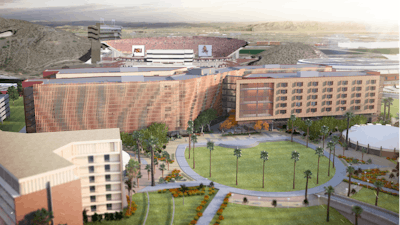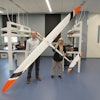
Engineering undergraduates moving into the Tooker House this week on Arizona State University's (ASU) Tempe, AZ campus will find themselves immersed in a collaborative, technology-laden living and learning community built specifically for engineers.
Tooker House is an approximately 1,600-person, co-ed residential community for undergraduate students in ASU’s Ira A. Fulton Schools of Engineering. The Fulton Schools Residential Community is a “dorm built for engineers” that features on-site digital classrooms, state-of-the-art makerspaces complete with 3D printers, laser cutters, and design tools needed for a broad range of engineering courses and projects.
Situated in a prominent location on the ground floor of the building, the maker lab allows students to work on class projects and explore ideas steps away from their living suites – essentially in their living room. The lab features sliding glass walls that encourage activities to spill outdoors, where exhibition pedestals enable students to present their work and invite discussion and feedback.
The seven-story community was built by American Campus Communities on the ASU campus. The residence hall features a 525-seat dining facility, Bluetooth-enabled laundry rooms that notify residents when their clothes are dry, advanced green building technology and enough high speed internet bandwidth to accommodate multiple devices per resident.
Elton Forlemu, an ASU civil engineering sophomore serving as a community advisor in Tooker House this fall, says “the work and study spaces are inspiring.”
Last year Forlemu lived off campus and spent hours studying and working in engineering classroom buildings, then traveling about 20 miles home to Glendale. He now envisions himself having late-night discussions in Tooker study spaces and then heading to the makerspace or computer lab to collaborate on a project “before it leaves your head.”
Architectural firm Solomon Cordwell Buenz’s design approach to Tooker House began with traditional desert architecture concepts as a starting point for creating a sustainable building that both feels appropriate to its context and can endure harsh desert conditions. The community features a complementary color palette of desert tones, using colors and materials that will resist fading and degradation under extreme UV exposure conditions.
The building’s most striking feature, hundreds of vertical perforated louvers on the south façade, each positioned according to a sophisticated algorithm, ensures daytime sunlight control unique to each window’s location. Highly efficient glazing with significant shading capacity allows transparency and daylight without detriment to thermal performance and comfort. Metal window canopies and vertical metal louvers additionally shade windows from direct sunlight while preserving views.
“Last year, I watched the building process from skeleton to finished project,” says Forlemu, who aspires to build hospitals and large business complexes. “As an engineer, it was fascinating. What gets me is the infrastructure – there is such great use of space here.”
Tooker House also will play a prominent role as ASU expands its smart campus capabilities, incorporating sensing and energy efficiency analytics and other Internet of Things (IoT) technologies not only into the building’s operation, but also into the engineering program’s curriculum.
The new residence hall is named for Diane and Gary Tooker. Diane Tooker is an alumnus of ASU’s Mary Lou Fulton Teachers College (BAE ’61) and a business owner and former elementary school teacher. Gary Tooker is an alumnus of the Fulton Schools of Engineering (BSE ’62) and a former CEO of Motorola. Together, the couple has made contributions to ASU through the ASU Foundation for more than 30 years, including support for the university’s teaching and engineering programs and the endowed Diane and Gary Tooker Chair for Effective Education in Science, Technology, Engineering and Math. Gary Tooker’s contributions to fostering Arizona’s tech sector were recognized with a lifetime achievement award presented at the 2012 Governor’s Celebration of Innovation.
Tooker House is owned and developed by American Campus Communities under the company’s American Campus Equity (ACE) program, a public-private partnership that provides on-campus housing to universities without using their funds or tax-payer dollars.






















